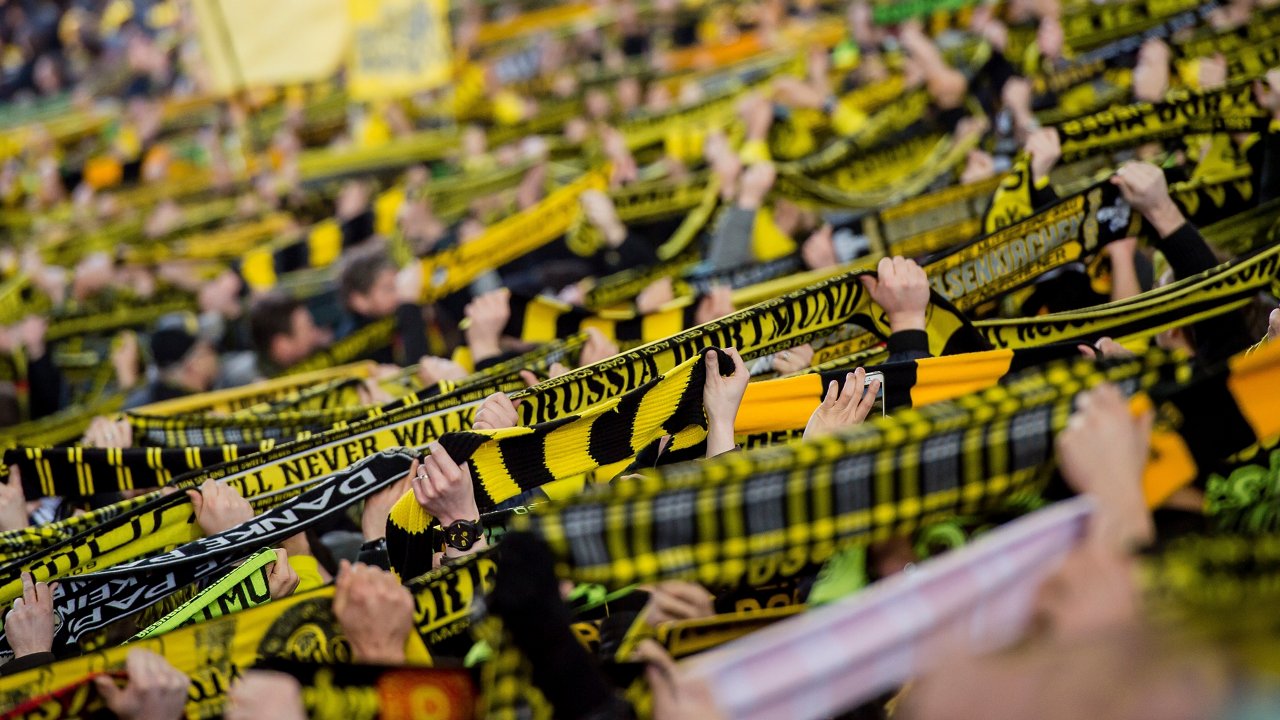1969 – The Reascent
The seventies were marked by financial hardships. This was accompanied by a decline in sporting performance, which took four years to rectify. With the construction of the Westfalenstadion, Borussia Dortmund gained an economic foundation. The fans returned.
At the beginning of the decade, BVB experienced a brief sporting upturn, finishing the 1969/70 season in fifth place. However, the decline in attendance, which had begun in 1967, continued. As a consequence, Lothar Emmerich was sold in 1969, and Wolfgang Paul ended his career a year later. Equivalent replacements were not recruited. On the contrary, key players like Held, Wosab, Weist, and Neuberger were sold ahead of the 1971/72 season – resulting in only 20 points and a 17th-place finish. After 36 years in the top flight, relegation loomed. Only 8,900 spectators on average attended matches in the 1973/74 season (placing sixth in the Regionalliga West).
To secure the license, the board, led by the ultimately successful restructurer Heinz Günther, had to sell the club's grounds on Brackeler Straße. The two-tiered Second Bundesliga was introduced in 1974/75. BVB finished sixth in the inaugural year. With a second-place finish the following year, Borussia reached the promotion play-offs against 1. FC Nürnberg, the runners-up in the south. After a 1-0 win in the first leg, on June 23, 1976, a 3-2 victory at the Westfalenstadion (both matches were very tight!) secured the return to the top flight. Among the celebrated heroes was goalkeeper Horst Bertram – the only player who remained loyal to the club between relegation and promotion.
A spectator average of 43,282 was the highest among all 18 Bundesliga clubs in the 1976/77 season. Borussia finished the season in a secure eighth place.
3.5
Anecdotes from the Decade
Westfalenstadion Dortmund Opens
With a charity match benefiting the financially struggling Dortmund team between BVB and FC Schalke 04 (0-3), today marked the festive opening of the Westfalenstadion in Dortmund, arguably Germany's most beautiful dedicated football stadium. The inauguration was conducted by Mayor Günter Samtlebe and BVB President Heinz Günther. The modern stadium, built by the city of Dortmund for the 1974 FIFA World Cup, boasts 54,000 seats, with 80% of them covered. Following the World Cup, it will be at the disposal of Borussia Dortmund, currently playing in the Regionalliga. The Westfalenstadion cost 32 million Marks, with the city contributing "only" six million, and the remainder funded by the state of North Rhine-Westphalia, the federal government, and the Glückspirale lottery. The decision to build the stadium was made by a roll call vote in the city council, reflecting significant controversy across party lines regarding the wisdom of constructing the stadium. Dortmund is looking forward to hosting the matches between Zaire and Scotland, Bulgaria and the Netherlands, the Netherlands and Sweden, as well as a semi-final match between Brazil and the Netherlands, as part of the World Cup.
Notably, the first goal at the Westfalenstadion was scored by a young lady named Elisabeth Podschwadtke at 6:18 pm in the pre-match between TBV Mengede and VfB Waltrop. Today's opening was unofficial. The German Football Association reserves the right to officially hand over the Westfalenstadion in two weeks with the international match between Germany and Hungary.
Zoltan's Pigeon Catch
As a master of pigeon catching, Hungarian midfielder Zoltan Varga proved himself at the Westfalenstadion during a BVB home game. Like a cat, Varga stealthily approached a pigeon that had been lingering between the corner flag and the BVB goal in the first hour of the match. A deceptive maneuver in the wrong direction, a targeted jump "around the corner," and amidst the cheers of the BVB fans, the seasoned international player held the "unknown flying object" in his hands. Equipment manager Walter Betzer took charge of the precious capture and released it outside the Westfalenstadion.
Goal Avalanche - Rehhagel's Departure
Borussia Dortmund officially suspended their coach, Otto Rehhagel, this morning. Yesterday, in their final match of the season at the Rheinstadion in Düsseldorf, BVB suffered a sensational 0-12 defeat against Borussia Mönchengladbach. Borussia played so desolately overall that one could only feel sorry for BVB substitute goalkeeper Peter Endrulat. With this result, BVB nearly handed the 1978 German Championship to Gladbach. Only the fact that 1. FC Köln won 5-0 against FC St. Pauli prevented an additional championship scandal in the Bundesliga.
Rehhagel had been coaching BVB since June 1976. In a "cloak-and-dagger operation," he was poached from SV Werder Bremen at the Jagdschlösschen Ascheberg and then, as successor to Horst Buhtz, led BVB back to the highest German league with two spectacular victories over 1. FC Nürnberg.

